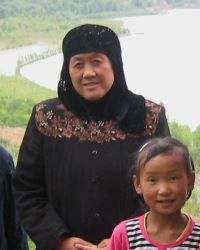Salar in China

Photo Source:
Anonymous
|
Send Joshua Project a map of this people group.
|
| People Name: | Salar |
| Country: | China |
| 10/40 Window: | Yes |
| Population: | 165,000 |
| World Population: | 165,000 |
| Primary Language: | Salar |
| Primary Religion: | Islam |
| Christian Adherents: | 0.01 % |
| Evangelicals: | 0.01 % |
| Scripture: | Portions |
| Ministry Resources: | Yes |
| Jesus Film: | No |
| Audio Recordings: | Yes |
| People Cluster: | Turkmen |
| Affinity Bloc: | Turkic Peoples |
| Progress Level: |
|
Introduction / History
The Salar have a colorful tale of their history. They say they originated in the famous city of Sarmarkand, located in today's Uzbekistan. In the eleventh century a tribe known as the Salor fled persecution in their homeland. They were forced to migrate across the mountains of Central Asia. Not knowing where they were going, the Salar strapped a Koran to a camel's head and asked Allah to guide them to wherever he wanted them to settle. After many months of travel, a Salar imam had a vivid dream of a beautiful waterfall. The next day the travelers came to the same waterfall. The camel stopped to drink and turned into a large white stone. Taking it as a divine sign, the tribe stopped there and began to build a community.
In 1781 the Qing armies crushed a Salar uprising. The Salar suffered massive losses. As many as 40% of their entire population were obliterated in the battle.
Although the Salar hold the distinction of being one of China's official nationalities, they are very similar to the Uyghurs of Xinjiang. Their language is virtually the same as Uygur. One expert lists Salar as a Uyghur dialect, and notes that "The main difference between the Salar and the Uyghurs of Xinjiang is geographical."
The majority of the Salar can speak their language, which is part of the Turkic family. Because the Salar live at the crossroads of several great civilizations, many are bilingual or multilingual in Chinese, Uyghur and Amdo Tibetan. A 1960 study found 7% of the Salar vocabulary was Persian-Arabic, in addition to a few Mongolian and Tibetan loanwords.
What Are Their Lives Like?
Divorce is a simple procedure for the Salar. The husband merely announces, "I don't want you any longer," and the woman leaves the home. She is free to marry again.
In the 2020s, the Chinese government stepped up their efforts to persecute and perhaps destroy the Muslim peoples in their country. The Salar people are in danger. Most likely they are forced into indoctrination camps along with the Uighurs and other Muslims.
What Are Their Beliefs?
The Salar were reportedly converted to Islam as recently as 1750 by Muhammed Amin. By the early 1980s, the Salar worshiped in 73 mosques throughout Xunhua County. Many more mosques have been opened in recent years. Although they have lived beside Tibetans for centuries, the Salar have resisted all pressure to convert to Tibetan Buddhism.
Before 1949 few missionaries reached out to the Salar. In the 1920s an appeal was made for "workers to give their whole time to the Salar." Ralph Covell laments, "Missionaries talked about the Salar but the rigors of a harsh climate, and a demanding geographical environment [meant] only a few were prepared for the necessary long-term commitment and sacrifices." No church has ever been established among the Salar, although there are a small number of Salar attending a Han Chinese church in Xining City.
What Are Their Needs?
Because the Salar are Muslim, they do not know Christ offers them acceptance based on grace rather than works.
Prayer Points
Pray for the authority of Christ to bind hindering spiritual forces and lead them from darkness to light.
Pray for signs and wonders to happen among them and for great breakthroughs with a rapid multiplication of disciples and house churches.
Pray for bold workers who are driven by the love of the Holy Spirit to go to them.
Pray for an unstoppable movement to Christ among them.